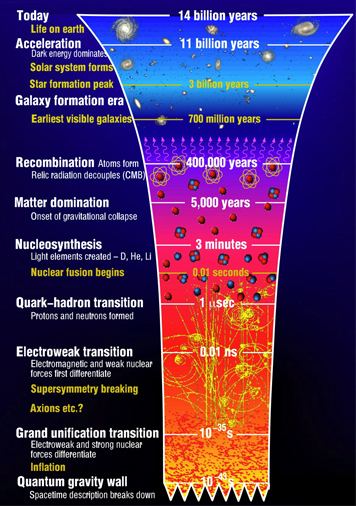Chronology of the Universe
Cosmology regimes
The history of the Universe divides roughly into three regimes that reflect the status of our current understanding:Thestandard cosmology is the most reliably elucidated epoch, or era, spanning the time between about one hundredth of a second after the Big Bang through to the present day. The standard model for the evolution of the Universe in this epoch has faced many stringent observational tests. Having said that, the standard cosmology still has a number of unresolved issues.
Particle cosmology builds a picture of the Universe prior to this at temperature regimes that still lie within known physics. For example, high energy particle accelerators at CERN and Fermilab allow us to test physical models for processes which would occur only 0.00000000001 seconds after the Big Bang. This area of cosmology is more speculative, as it involves at least some extrapolation, and often faces intractable calculational difficulties. Many cosmologists argue that reasonable extrapolations can be made to times as early as a grand unification phase transition.
Quantum cosmology considers questions about the origin of the Universe itself. This endeavours to describe quantum processes at the earliest times that we can conceive of a classical space-time, that is, the Planck epoch from the beginning of the Universe to 0.0000000000000000000000000000000000000000001 seconds after its beginning. Given that we as yet do not have a fully self-consistent theory of quantum gravity, this area of cosmology is more speculative.

